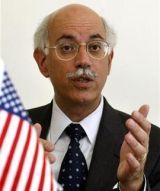US envoy pours cold shower over UN chief Darfur diplomacy
April 2, 2007 (UNITED NATIONS) — US envoy disagreed yesterday with UN Secretary General request to delay plans to press for sanctions against Sudan, saying that UN Security Council must go ahead with tough measures.
 Andrew Natsios, President Bush’s envoy for Sudan, told Ban in a closed-door meeting Monday that the 15-nation Security Council must punish Khartoum for its defiance of U.N. resolutions demanding that it allow more peacekeepers into Darfur, the Washington Post reported.
Andrew Natsios, President Bush’s envoy for Sudan, told Ban in a closed-door meeting Monday that the 15-nation Security Council must punish Khartoum for its defiance of U.N. resolutions demanding that it allow more peacekeepers into Darfur, the Washington Post reported.
Natsios suggested that a failure to act quickly could push Congress to adopt harsher measures. According to one US official, Natsios cited bills that would support the right of states to divest their financial holdings in companies that do business with Sudan and ban those firms from tapping U.S. capital markets.
The Bush administration has previously opposed such measures on the grounds that they could interfere with the president’s ability to conduct foreign policy and could drive potential foreign investors from U.S. markets. The proposals have also faced stiff opposition in the Senate.
The United States and Britain are preparing a U.N. draft resolution that would impose financial sanctions on Sudan, including targeted sanctions against individuals linked to atrocities there. They are also considering imposing a “no-fly” zone over Darfur if Sudan does not agree to accept thousands of U.N. peacekeepers.
“We’re continuing to look at what options we have for action through the Security Council as well as outside the Security Council,” said Ben Chang, a spokesman for the U.S. mission to the United Nations. “We believe pressure needs to be maintained on the government of Sudan.”
Ban said he reached an agreement with Bashir to hold discussions with the African Union next week in Addis Ababa, Ethiopia, on a plan to send a reinforced U.N. peacekeeping force of more than 2,250 troops to Darfur. He also announced plans for a high-level meeting in New York on April 16 and 17 with the head of the African Union, former Malian president Alpha Oumar Konare.
“Before we talk about sanctions, let me have some more political space to deal with this dialogue with them,” Ban said.
Violence broke out in Darfur in February 2003 when two rebel groups — the Sudanese Liberation Army and the Justice and Equality Movement — attacked police stations. Khartoum responded by equipping local Arab militias, known as the Janjaweed, and providing them with air support as they attacked villages, killing hundreds of thousands of civilians and driving more than 2 million people from their homes. The Bush administration has accused the government of genocide.
(Washington Post/ST)
